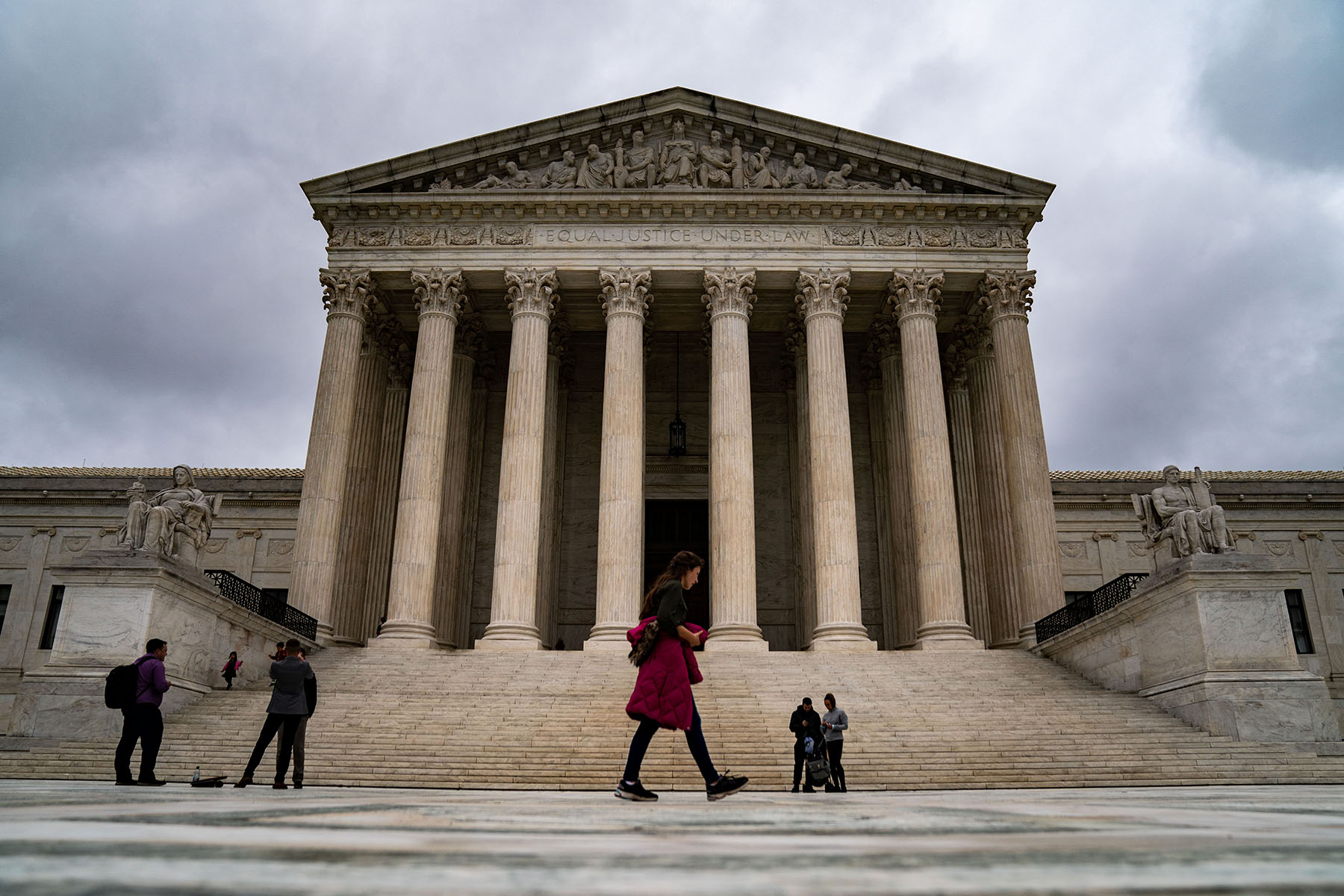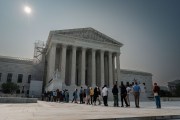Less than two years ago, the Supreme Court eliminated the federal right to an abortion, a decision that the court’s conservative majority suggested would remove them from further litigation of abortion rights..
”The Court’s decision properly leaves the question of abortion for the people and their elected representatives in the democratic process,” Justice Brett Kavanaugh wrote in a concurring opinion.
But this term, the court is now set to hear two cases that could further undercut access to the procedure.
As those cases unfold, doctors who care for pregnant people say their work has taken on new levels of uncertainty; they’re unsure what care they can legally provide and often unable to follow best medical practices.
“I feel like I’m standing in the middle of a crowded room, screaming, warning, ‘Bad things are coming,’ and nobody’s listening,” said Dr. Amy Adante, an OB-GYN from outside of Chicago, where abortion remains legal.
The cases touch on different legal questions and could affect the entire country, not just states that have banned abortion. One, stemming from a challenge filed in Texas, concerns the Food and Drug Administration’s (FDA) approval of mifepristone, which is one of two drugs commonly used in medication abortions. The other, out of Idaho, addresses whether the federal emergency medicine law known as EMTALA protects the right to an abortion when it is the necessary treatment to save the life of a patient. The EMTALA case is set to be argued in April; the court has not set a date for arguments in the mifepristone case.
Doctors across the country told The 19th that they have struggled to stay on top of the latest developments in abortion lawsuits since the Supreme Court’s decision in Dobbs v. Jackson Women’s Health Organization, which overturned federal abortion protections. That confusion, some said, could stop physicians even from providing legal pregnancy-related health care.
“We have been on a perpetual roller coaster since Dobbs,” said Dr. Nikki Zite, an OB-GYN at the University of Tennessee, where abortion is almost completely illegal. “We’re dealing with Dobbs and what’s the ‘the new normal’ — and things are still in flux.”
Mainstream medical institutions have criticized the substance of both lawsuits. Doctors in states with and without bans told The 19th they worried about the cases’ impact on their ability to care for their patients.
In the mifepristone case, the Supreme Court will consider whether to rescind 2021 FDA approval that allowed the drug to be distributed virtually. Major medical organizations have noted that doing so would run against the mainstream scientific consensus, which finds that the drug is safe and effective for patients to use at home. Limiting access to the drug — a change that would take effect across the country, including in states where abortion is legal — would also affect doctors’ ability to care for patients experiencing miscarriages, which rely on the same treatment.
Medication abortions can still be safely performed without mifepristone by using larger doses of misoprostol, the other drug in the regimen. But abortions using only misoprostol have a slightly higher failure rate and can have a higher risk of complications, including heavy bleeding.
“Using mifepristone for abortion and for management of miscarriage and for second-trimester loss or second-trimester termination is safer and faster,” Zite said. “When we don’t have the option of mifepristone, we’ll have more visits to the emergency room, more visits to the operating room and more blood utilization.”
-
Read Next:
In the EMTALA case, the high court will consider a federal regulation that holds physicians can provide abortions, even in states where the procedure is banned, when it is needed to save the pregnant person’s life. That regulation is in effect in all but two of the states with near-total abortion bans, though its impact is limited: The penalties for violating EMTALA are far less than for breaking many state abortion bans, which means that in some cases, individual hospitals are still less likely to offer the procedure even in situations where the federal law requires doing so.
And still, the vast majority of abortions are not covered by EMTALA’s protections. While they may be important for a patient’s health or long-term prognosis, that isn’t necessarily the same thing as being needed to stabilize a patient.
Still, the federal regulation has provided at least some protection, health care providers say. In the two states where the EMTALA regulation has been blocked — Texas and Idaho, thanks to separate court rulings — physicians say the absence of federal protections has made it nearly impossible to care for patients experiencing life-threatening conditions such as sepsis, preterm premature rupture of membranes, ectopic pregnancies or heavy bleeding. In some cases, physicians have been forced to transfer such patients to facilities in other states, delaying life-saving care.
The case’s implications are deeply concerning, said Dr. Jonas Swartz, an OB-GYN and abortion provider in North Carolina, where abortion is banned after 12 weeks, with some exceptions for cases of rape, incest, fetal anomalies and the life of the pregnant person. If the court finds that state abortion bans trump the federal emergency medicine law, he said, that could lead to tighter restrictions across the country.
-
Read Next:
“If the Supreme Court were to decide a maternal health emergency won’t be enough to justify abortion, it will embolden state legislators to tighten laws and take away the exceptions for maternal health conditions where they exist,” he said. “Will that mean North Carolina legislators say we don’t have to value maternal life?”
Adanta, the Chicago-area physician, voiced similar concerns. In the year and a half since Roe fell, she has seen an increasing number of pregnant patients from other states, including those with medical crises best treated by an abortion. Illinois has experienced the largest increase in abortions performed since Roe’s overturn, a change researchers attribute to more people traveling there for care.
“I have saved people’s lives by providing abortion care for them,” Adanta said. “When you talk about physicians having their hands tied and not being able to provide timely, urgent care? That’s a helpless feeling for those physicians, and a very scary feeling for the receiving physicians. These are medical emergencies, and patients can go from being stable to unstable very quickly. Time matters.”
Already, physicians in states like Texas and Idaho have taken earlier retirements or left the profession in part because of abortion laws. The heightened confusion and legal back-and-forth over what kind of care is allowed could lead to a larger physician exodus, said Dr. Jen Lincoln, an Oregon-based physician and member of the board of directors of Mayday Health, a nonprofit organization that helps educate people about where to access medication abortion pills.
The cases underscore just how much is still shifting, said Greer Donley, an associate professor of law at the University of Pittsburgh.
“The fact that you’re so quickly after Dobbs seeing the Supreme Court have to weigh in on so many abortion suits — and more and more will just keep coming — is indicative of where we are.”








